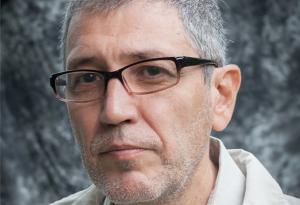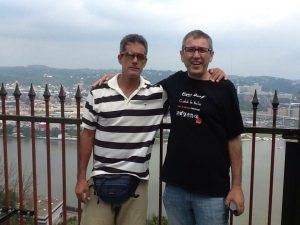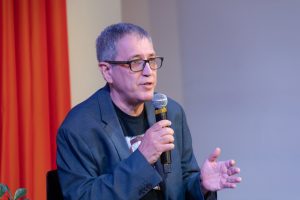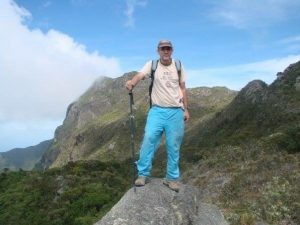Memories in Exile: Israel Centeno on Venezuela and the Wonders of Pittsburgh
by Sampsonia Way Staff / February 6, 2020 / Comments Off on Memories in Exile: Israel Centeno on Venezuela and the Wonders of Pittsburgh
By Kriti Sanghi and Thia Paruchuru

Photo from Sampsonia Way archive (2016)
The following conversation is part of an ongoing series called Memories in Exile, in which we interview current and former resident writers who have come to Pittsburgh and lived in exile on Sampsonia Way. The series is in celebration of City of Asylum/Pittsburgh’s 15th year, capturing the diverse experiences of writing and living in exile. Throughout these conversations, we explore how memory shapes writing and how the experience of memory is unique for writers who are under threat of violence and persecution. Each interview is edited in collaboration with the writer.
Israel Centeno has authored more than a dozen novels, including The Conspiracy, and is regarded as one of the most important Venezuelan literary figures of the past 50 years. He has won numerous awards, including the Federico Garcia Lorca Award in Spain and the National Council of Culture Award in Venezuela in 1991. His work deals with culture, society, and urban dystopias. Centeno, his wife, and his two daughters first moved to Pittsburgh in 2011 for City of Asylum’s exiled writer-in-residence program. Sampsonia Way interviewed Centeno last October when he visited City of Asylum from his home in Houston. Since then, Centeno has returned to live and write in the Pittsburgh community.
Hola! Good evening! Welcome back to the City of Asylum! We’re so honored to have you here. How are you doing?
I’m okay. I’m so excited to be back in Pittsburgh. It’s like my second city!

Photo provided by Israel Centeno
Wow! You consider Pittsburgh to be your second city?
I left Venezuela almost 10 years ago, and the city where I lived the most, after Caracas, was Pittsburgh. I lived in Pittsburgh for almost eight years. When I arrived here this morning, I had the same feeling that most people have when they return home: a moment where they feel less vulnerable, more comfortable, and more at peace.

Photo from City of Asylum Facebook (2019)
What has your experience been like in the United States?
It has been difficult for me. I left Venezuela to save my life. So my first priority was to keep me and my family safe. The people at City of Asylum helped us a lot. They helped us to find out about college and scholarships for our two daughters. They were family to us, our first family here, but the weight of responsibility still hung over me. I couldn’t afford to lose my focus. When I left Venezuela, I had been writing for almost 30 years and wanted to continue my career as a writer in Pittsburgh.
But then, I lost my publishing house. My publisher told me that because I had lost my natural market, it was no longer profitable for them to publish my works. But I couldn’t simply move forward because the American publishing market is a monster. Venezuelan markets, on the other hand, are different. Although Venezuela has a rich literary culture, our writers have almost exclusively relied on national publishing houses. This has been particularly true ever since the 70s when modernity broke and the state took hold with the exploitation of oil. Culturally, the state has always exercised its sponsorship and has been a mediator. There is no market. That is why I say that the market in Venezuela, as it is known in America, has never existed.
After the loss of my publishing house, I kept writing. I wrote a novel titled The Sun Never Sets on Tokyo. But when my residency ended, I had to find a job. I worked at Uber for some time before I found a job in Allegheny General Hospital as an orderly, transporting patients around the hospital. I worked at AGH for three years and made great friends. I was grateful for a lot of things, but I was also frustrated. Day in and day out, I was engaged in the struggle to make a living and survive. But I wanted to write. I wanted to teach. It’s what I did in Venezuela. There were maybe two or three teaching positions in the United States that would consider me, but they were very, very competitive. So I couldn’t return to teaching, and I didn’t have time to comfortably write. I had to find time to write, and even then, I could finish only two novels, which was frustrating because writing is vital for me. Before coming to the United States, I had written so much that I was able to publish 14 or 15 novels.
Were there any memories of home that anchored you through this experience?
The sea… the sea. Venezuela has a beautiful beach. Venezuela has peaceful coastal places. When I was a child, I used to hike up a huge mountain between the Caracas Valley and the Caribbean Sea. I cannot do that now.
The other day, I remembered something we do with coconuts, a memory from my early youth. But truthfully, I don’t want to remember these memories. It’s very painful. I love the United States. I have been living here, and I have plans to die here, as well. But Venezuela was where I was born, where I grew up, and where I took my first steps. My sense of self was developed in Venezuela. And it’s very difficult to detach from the country, even when I want to, because of social media and the news. It reaches a point where I want to say, “Stop, Venezuela! I don’t want to know anything about you.” But she comes back to me! And it hurts.
In Venezuela, there is a man named Rafael Cadenas. He’s an inspirational figure for us — a Venezuelan symbol of resistance. I recognized his monologue on one of the walls here, at Sampsonia Way. I didn’t realize that there were so many things keeping me so close, and yet so far, from my own country.

Photo provided by Israel Centeno
What was it like coming to the City of Asylum for the first time from Venezuela?
I felt wonder — everything for me was a wonder. It was beautiful. I was born in a poor neighborhood in Caracas. The first time I slept in a bedroom in Pittsburgh, the ceiling was partially made of glass. I could see the sky. In that moment, I felt free. I felt like I had made it to a place where I could have a fresh start.
I used to bike to get lost in the city, and so, I ended up discovering the city. Back then, Pittsburgh wasn’t like it is today. It was in the process of reinventing itself, of being reborn. I witnessed a lot. I saw how Downtown changed, how the streets became vibrant, how Alphabet City was coming together. The whole city was rising up like a phoenix, brimming with new people. Pittsburgh was welcoming people from everywhere, young people, people with different kinds of ideas — entrepreneurs. I felt that I was in a wonderful place — the right place.




